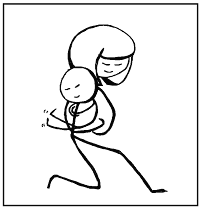
It is interesting that both my mother and I have had to work through a process of finding the “he-ness” of God in our worship alienating and from this alienation moving to an understanding of God as non-gendered/God as all-gendered. I grew up in a home that by no means insisted on the maleness of God; however, the worship I participated in and our translations of the bible reinscribe God a male. So, despite my opportunity to grow up with an understanding of God in femaleness and God in all-genderedness, I had to — still have to! — work to rewrite the words I speak each Sunday in my head.
Why do we still do this? If I understand correctly, God in the Hebrew Scriptures (in Hebrew) is not specifically designated as male. I would expect that the excellent biblical scholarship being done these days would have demanded ELW and our biblical translations used in church to represent this this. You might also think that the politics of gender inclusivity that we espouse in the ELCIC would demand an acknowledgement of the oppression inscribed in the very language we use to worship.
So where does this connect with parenting? As a mother it is my hope that my daughter doesn’t have make the same journey my mother and I made. Instead, I hope my daughter carves new paths for us- finds new areas of contention to battle. So, at home we re-write our lullabies. “I know your from the Father’s hand” has become “I know you are from the Maker’s hand” The maker in this song we call “she.” In other songs we switch the gender of the pronoun for God from verse to verse. These are small things. But I know that every Sunday in church she will hear that God is He and God is Father. As a result, we need to be intentional about mixing it up a little at home.
What it really comes down to is not language, but to my daughter’s sense of herself as a holy being, her sense that the creator knows her intimately, and that God is not a purveyor of the gender inequality and the restrictive gender categories that still exist today. Rather, these injustices are the effects of human labels and the limits of our linguistic structure. In short, I want my daughter to grow-up always already knowing that gender is not divinely appointed; it is a human-made system that even restricts our understanding of God! But because gender is a human made set of labels, we can change it, and that is the good news.
 RSS Feed
RSS Feed
